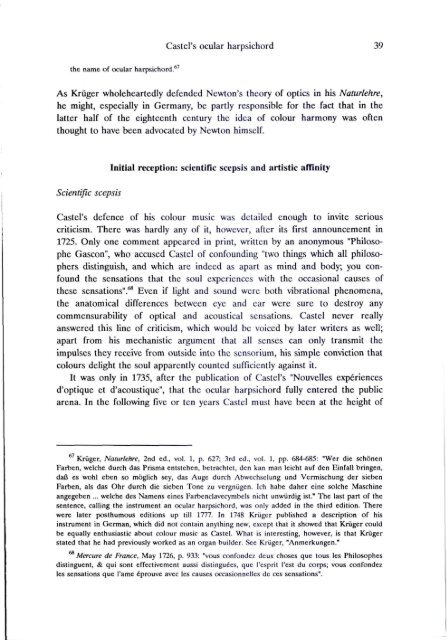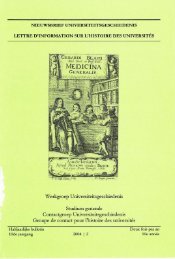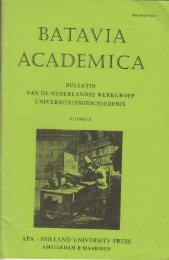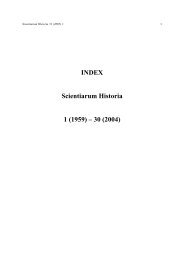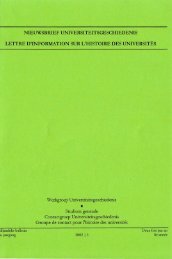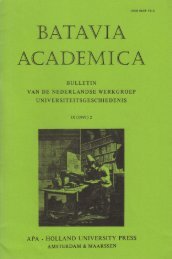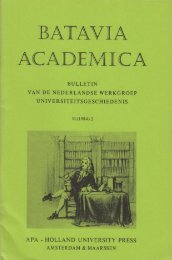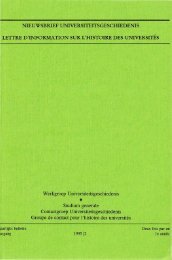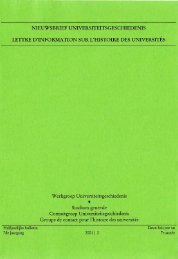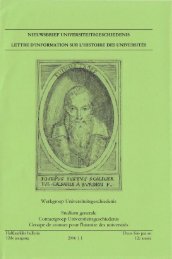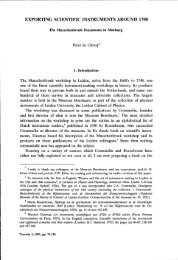the ocular harpsichord of louis-bertrand castel - Gewina
the ocular harpsichord of louis-bertrand castel - Gewina
the ocular harpsichord of louis-bertrand castel - Gewina
You also want an ePaper? Increase the reach of your titles
YUMPU automatically turns print PDFs into web optimized ePapers that Google loves.
Castel's <strong>ocular</strong> <strong>harpsichord</strong> 39<br />
<strong>the</strong> name <strong>of</strong> <strong>ocular</strong> <strong>harpsichord</strong>.<br />
As Kriiger wholeheartedly defended Newton's <strong>the</strong>ory <strong>of</strong> optics in his Naturlehre,<br />
he might, especially in Germany, be partly responsible for <strong>the</strong> fact that in <strong>the</strong><br />
latter half <strong>of</strong> <strong>the</strong> eighteenth century <strong>the</strong> idea <strong>of</strong> colour harmony was <strong>of</strong>ten<br />
thought to have been advocated by Newton himself.<br />
Initial reception: scientific scepsis and artistic affinity<br />
Scientific scepsis<br />
Castel's defence <strong>of</strong> his colour music was detailed enough to invite serious<br />
criticism. There was hardly any <strong>of</strong> it, however, after its first announcement in<br />
1725. Only one comment appeared in print, written by an anonymous "Philosophc<br />
Gascon", who accused Castel <strong>of</strong> confounding "two things which all philosophers<br />
distinguish, and which are indeed as apart as mind and body; you confound<br />
<strong>the</strong> sensations that <strong>the</strong> soul experiences with <strong>the</strong> occasional causes <strong>of</strong><br />
<strong>the</strong>se sensations".** Even if light and sound were both vibrational phenomena,<br />
<strong>the</strong> anatomical differences between eye and ear were sure to destroy any<br />
commensurability <strong>of</strong> optical and acoustical sensations. Castel never really<br />
answered this line <strong>of</strong> criticism, which would be voiced by later writers as well;<br />
apart from his mechanistic argument that all senses can only transmit <strong>the</strong><br />
impulses <strong>the</strong>y receive from outside into <strong>the</strong> sensorium, his simple conviction that<br />
colours delight <strong>the</strong> soul apparently counted sufficiently against it.<br />
It was only in 1735, after <strong>the</strong> publication <strong>of</strong> Castel's "Nouvelles expdriences<br />
d'optique et d'acoustiquc", that <strong>the</strong> <strong>ocular</strong> <strong>harpsichord</strong> fully entered <strong>the</strong> public<br />
arena. In <strong>the</strong> following five or ten years Castel must have been at <strong>the</strong> height <strong>of</strong><br />
Kriiger, Naturlehre, 2nd ed.. vol. 1, p. 627; 3rd ed., vol. 1, pp. 684-685: "Wer die schonen<br />
Farben, welche durch das Prisma entstehen. bctrachtet, den kan man leicht auf den Einfall bringen,<br />
daU cs wohl eben so moglich sey, das Auge durch Abwechsclung und Vermischung der sieben<br />
Farben, als das Ohr durch die sieben Tone zu vergniigen. Ich habe daher eine solche Maschine<br />
angegeben ... welche des Namens eines Farbcnclavecj'mbels nicht unwiirdig ist." The last part <strong>of</strong> <strong>the</strong><br />
sentence, calling <strong>the</strong> instrument an <strong>ocular</strong> <strong>harpsichord</strong>, was only added in <strong>the</strong> third edition. There<br />
were later posthumous editions up till 1777. In 1748 Kriiger published a description <strong>of</strong> his<br />
instrument in German, which did not contain anything new, except that it showed that Kriiger could<br />
be equally enthusiastic about colour music as Castel. What is interesting, however, is that Kriiger<br />
stated that he had previously worked as an organ builder. See Kruger, "Anmerkungen."<br />
Mercure de France, May 1726, p. 933: "vous confondez deux choses que tous les Philosophes<br />
distinguent, & qui sont effectivement aussi distinguees, que I'esprit I'est du corps; vous confondez<br />
les sensations que I'ame ^prouve avec les causes occasionnclles de ccs sensations".


